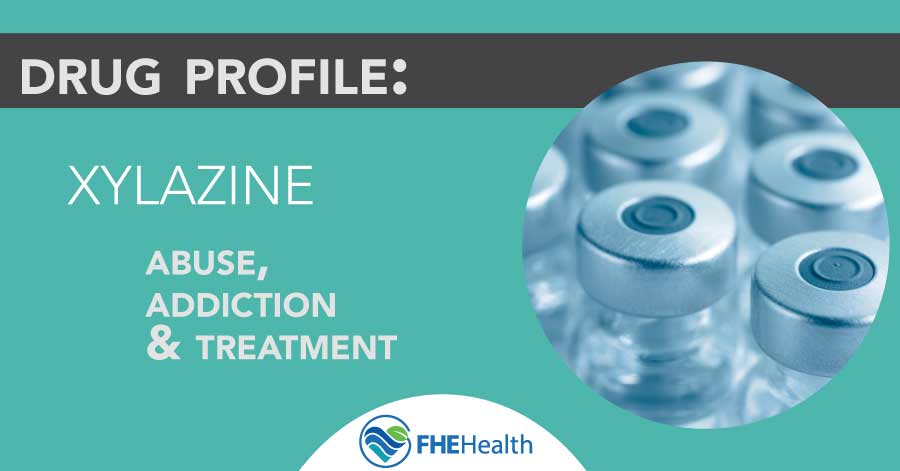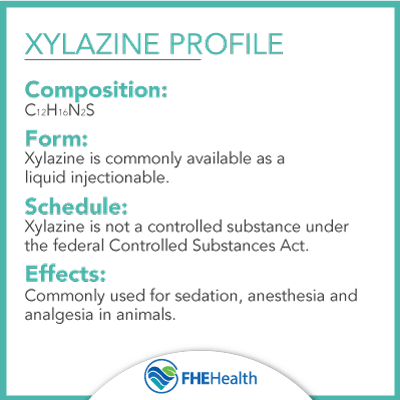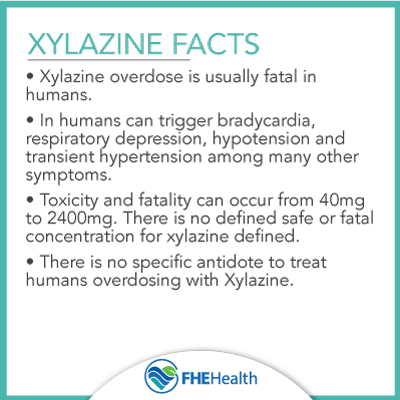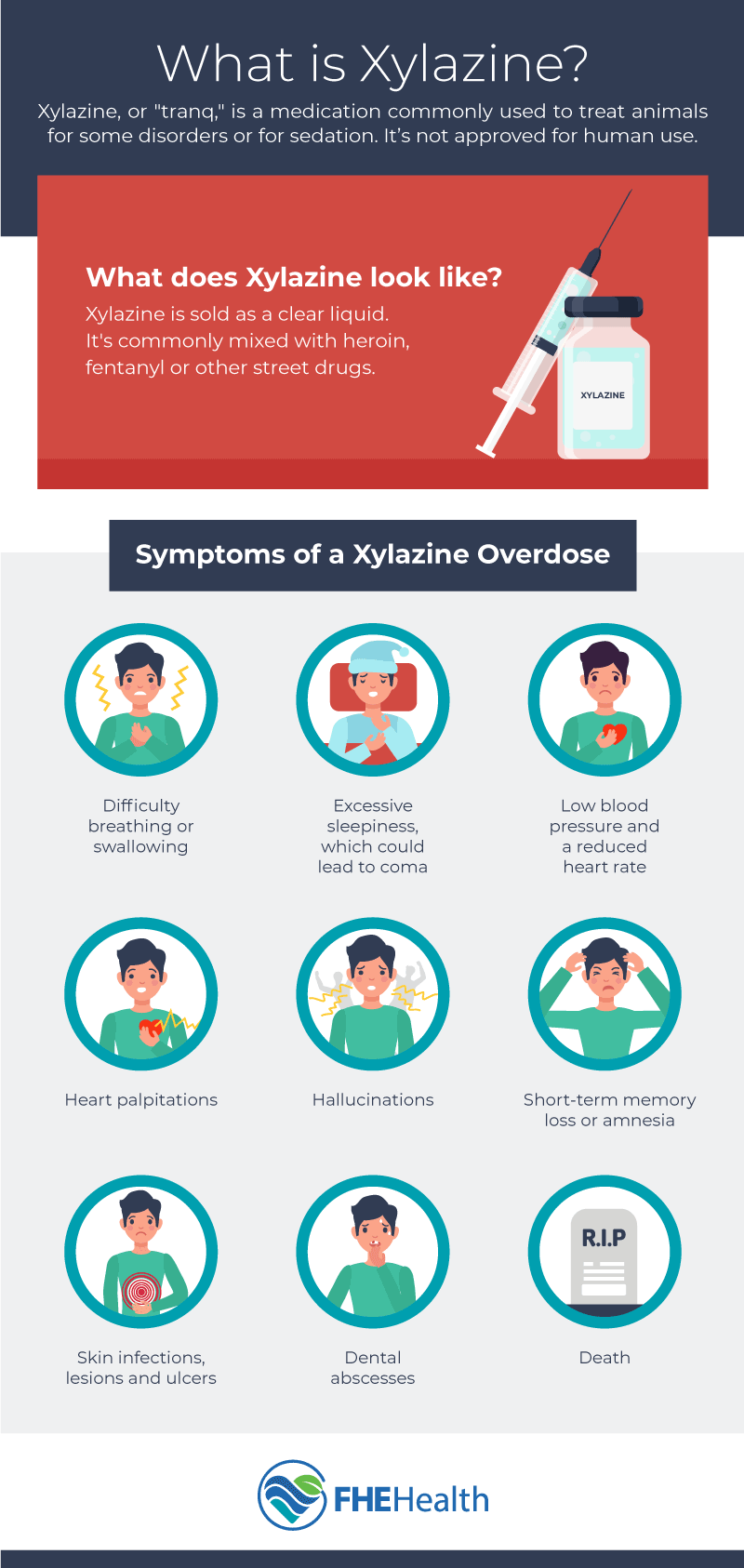
Medications that were never meant for human use are becoming more common components of street drugs. These types of drugs are more difficult for law enforcement to control and easier for people to obtain because they don’t need a prescription. Xylazine is rapidly increasing in popularity, and this guide reviews what you need to know about this medication, its complications and how to treat an addiction.
What Is Xylazine?
 Xylazine is a medication commonly used to treat animals such as horses, cows and felines. It has a number of medical uses, including sedation and the treatment of some disorders. It’s not approved for human use, but the National Institute on Drug Abuse has reported a rise in the number of drug overdose events involving this medication. Xylazine is commonly laced with other street drugs rather than taken on its own.
Xylazine is a medication commonly used to treat animals such as horses, cows and felines. It has a number of medical uses, including sedation and the treatment of some disorders. It’s not approved for human use, but the National Institute on Drug Abuse has reported a rise in the number of drug overdose events involving this medication. Xylazine is commonly laced with other street drugs rather than taken on its own.
One of the reasons veterinarians prescribe xylazine is that it’s not an opioid. While it has a sedative effect, it doesn’t have the same adverse effects that administering opioids to animals would have. Even though it’s effective for multiple types of animals, xylazine was never intended for human use and could have serious side effects when misused.
What Does Xylazine Do?
Xylazine is primarily used to anesthetize animals about to undergo surgical procedures. It can also be used by animal control officers to subdue animals considered a threat to humans or themselves by inhabiting some areas. For example, xylazine may be used to tranquilize deer, elk and other forest animals.
When used for anesthesia, xylazine is combined with ketamine to ensure the animal remains unconscious long enough for a veterinarian to complete the prescribed procedure. Unlike ketamine, xylazine isn’t a controlled substance because it’s not meant for human use. This poses a huge risk because more people are acquiring it and the ability of law enforcement to track the distribution of the drug is limited.
Xylazine was first detected as a potential street drug when studies found that it was being used throughout Puerto Rico and made its way to the continental United States not long after. In 2006, it was involved in seven overdose deaths in the Philadelphia area. Most people presume that, because it isn’t an opioid, it’s safer to use than narcotics such as OxyContin or Vicodin.
How to Identify Xylazine
Xylazine is sold as a clear liquid and intended for intravenous use in animals. It’s difficult to determine whether someone has taken it because it’s often laced with fentanyl, heroin and other street drugs. Many people who are experiencing symptoms of opioid abuse may have xylazine in their bloodstream as well. As the drug has become more popular on the streets, it’s often been added to other substances without people’s awareness.
Xylazine is commonly referred to as a “tranq” due to its sedative effect, and people who turn to this drug may use it as an escape from anxiety and sleep disorders. The potential for serious side effects increases when it’s combined with other medications, street drugs or alcohol. The best way to determine if someone you know could be using xylazine is to pay attention to changes in behavior, mood and social interactions that may suggest they’re using drugs.
Examples of concerning changes in behavior include:
- Sudden withdrawal from social activities and increased need for privacy
- Changes in spending habits or failure to pay bills on time
- Sudden weight loss or gain and changes in eating behaviors
- Absenteeism at work, reduced work performance or lack of motivation
- Irritability, depression, manic episodes or mood swings
- Frequently asking to borrow money without giving clear answers about what it’s for
- Sudden changes in relationships with family members, significant others or friends
- Changes in physical appearance such as different skin tone, red and itchy eyes, tooth decay and hair loss
- Disinterest in personal hygiene and appearance
The only way to confirm someone is using xylazine is through a blood test. Testing a person’s blood can also reveal how much of the drug is present and whether it’s being taken with other substances such as fentanyl, methamphetamines, ketamine, morphine, painkillers or heroin.
Addiction to Xylazine
Xylazine is an addictive substance. Its initial effects can include feeling sedated and euphoric. When combined with substances such as alcohol, heroin, fentanyl or opioids, it prolongs the high so the user is under the influence for greater periods. This also increases the risk of serious side effects and makes it more difficult to treat someone for an overdose.
When used in combination with other drugs, xylazine in humans becomes much more addictive. Users become dependent on multiple drugs at once, such as developing an addiction to OxyContin laced with a xylazine dose. They may need to be treated for polysubstance abuse.
Symptoms of Xylazine Overdose
 Because xylazine depresses the central nervous system, the potential complications can be life-altering. Drowsiness is the most common effect, followed by a feeling of euphoria, but users may experience the following effects:
Because xylazine depresses the central nervous system, the potential complications can be life-altering. Drowsiness is the most common effect, followed by a feeling of euphoria, but users may experience the following effects:
- Difficulty breathing or swallowing
- Excessive sleepiness, which could lead to coma
- Low blood pressure and a reduced heart rate
- Heart palpitations
- Hallucinations
- Short-term memory loss or amnesia
- Skin infections, lesions and ulcers
- Dental abscesses
- Death
Xylazine was initially trialed for human use but never brought to market because of the frequency and severity of its side effects.
Treatment for Xylazine Addiction
If someone is having a suspected drug overdose involving narcotics, it’s common to use naloxone to treat the overdose symptoms until medical help arrives. Naloxone is sold under the name Narcan and can be purchased without a prescription to carry in case of an emergency. If someone is suffering from a xylazine overdose, naloxone may treat symptoms associated with other substances in their system but won’t address difficulty breathing because xylazine isn’t an opioid.
While there are no withdrawal symptoms to manage when someone stops taking xylazine, the substances that it’s mixed with often require prescription medications to assist with withdrawals. It’s important to address the addiction and underlying causes to prevent relapses toward future drug abuse. The best treatment options incorporate behavioral therapy, mental support services and education about coping mechanisms to help people with their addictions.
Getting the Help You Need
If you or someone you know has a substance abuse problem, it’s important to know you’re not alone. Help is just a phone call away, and our team of counselors can help you take the first step. Don’t hesitate to give FHE Health a call at (833) 596-3502 or fill out our contact form. We’re available 24/7 to offer guidance and support and to help you find the path back to your best life.







